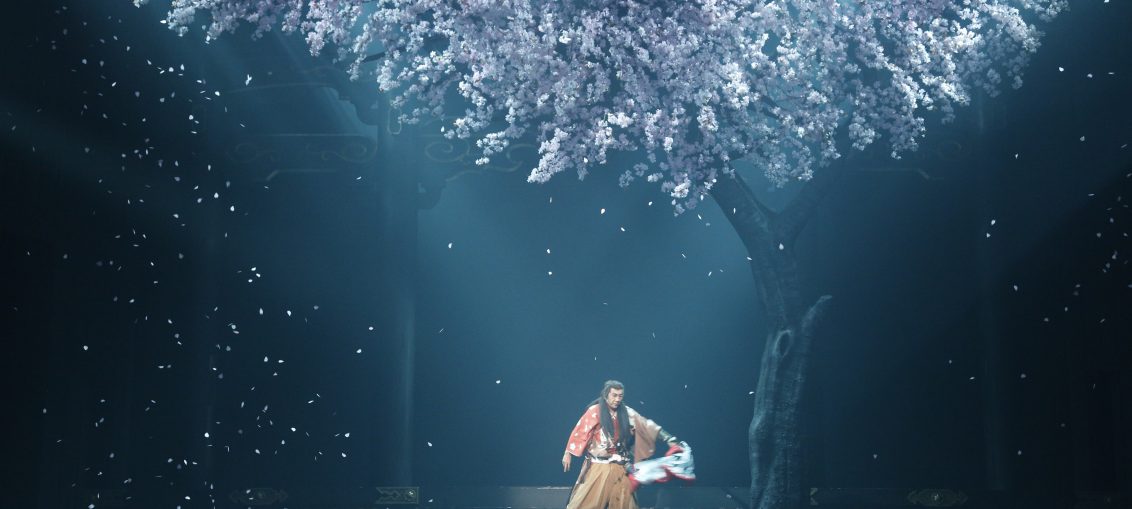
Feudal Japan might seem an unlikely setting for the Shakespearean masterpiece known as the “Scottish play,” but in actuality it could not be more interesting or appropriate, as was made clear through the vision of the late director, Yukio Ninagawa’s emotionally compelling, visually electrifying ode to the Bard’s killer couple — NINAGAWA Macbeth — playing at the David H. Koch Theater as part of Lincoln Center’s annual acclaimed Mostly Mozart Festival. This exceptional revival of Ninagawa’s landmark 1980 production was the last production overseen by the legendary director before his death in 2016 and these performances mark the work’s final bow, before it is retired from the stage for good.
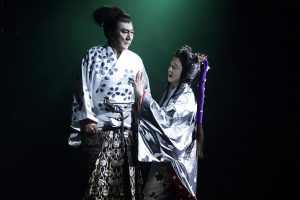
“Feudal Japan” refers to a period of Japanese antiquity between the 12th and 19th centuries which Shakespeare’s Elizabethan England falls squarely in the middle of. During these centuries Japan was ruled by powerful regional families (called “daimyo”) and warlords (know as “shogun”). At the time Shakespeare was penning plays and performing at The Globe Theatre, elsewhere in Japan; kabuki style theatre was just getting started and noh style was already popular and in practice. This era is one of the richest and most dynamic in Japanese history. It has been the background for countless films, TV series, animations and stage productions. Shakespeare’s epic dramas and tragedies are rife with the kinds of power struggles with a juxtaposition of loyalty, integrity and honor set against betrayals, intrigues and vengeance that would have been common amongst the “warring states” age. Film director Akira Kurosawa’s renowned Ran was based on King Lear and Throne of Blood on Macbeth — both took place in 16th century Japan. NINAGAWA Macbeth stands alongside those cinematic giants as not only one of the most imaginative representations of Shakespeare’s work, but one most uniquely suited to the time and place it was set.
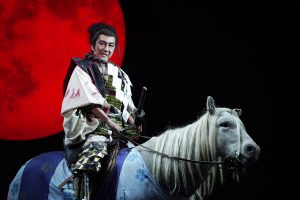
Only such a grand hall as the David H. Koch Theater could house such an enchanting, transporting and transformative accomplishment for its coup de grace. Seeing it is to understand and appreciate Macbeth with new eyes, awakened by the sheer beauty onstage and the depth of emotion and connection to the characters and words expressed by the brilliant cast. While it honors the Bard’s tale faithfully, it is uniquely Japanese. The pink snow of cherry blossom petals falls from above and decorates the stage with delicacy that offsets the horrors committed; Buddhist chants by ethereal voices alternate with music by Samuel Barber and Schuber; life-sized horses are supported by dancers who flick and kick their feet, mimicking the animals perfectly; ninja-like assassins enact the murderous wishes of the cruel Thane; and the three kabuki Witches (played by Kyozo Nakamura, Yamoto Kamiyama and Eiichi Seike) who foretell the prophecy which brews Macbeth’s wicked ambitions and thus seals his fate (and that of all around him) are not wretched hags, but stately ladies in flowing kimonos (the costumes were exquisite) with an otherworldly aura. Supernatural beings and phenomenon play a huge role in Japanese lore, so it is only all the more fitting when it is witches who act as oracles and that ghosts of those slain and “spots” on once bloodied hands haunt the minds and eyes of the guilty. The moon looms above, a blood red reminder of dastardly deeds done or yet to come, then turns an icy blue upon the final bow of that brings down the tyrant who fancied himself invincible, by the stroke of Macduff’s sword. The Japanese chanbara (sword-fighting) is thrilling and more graceful than any broadsword battle.
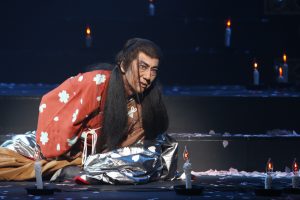
The entire cast is phenomenal, from the soldiers to the two peasants who opened the show by walking down the aisles and remain onstage for the show’s entirety. But special praise must be given to Masachika Ichimura (Macbeth), Yuko Tanaka (Lady Macbeth) and Keita Oishi (Macduff). The multi-layered dynamics between the Lord and Lady darts from tender to conniving — how like courtiers in the palace of Louis XIV or modern day political families! Ambition blinds judgment and the only way out seems to lead further down the rabbit hole of death and destruction, ending in their own madness and demise. But underlying it all there is a clear, profound love for one another and in his Lady, Lord Macbeth sees a true partner, something almost unheard of at the time for a woman (in England or Japan) to share such equality with her husband and possess such sway over his decisions. Oishi’s Macduff brought sincerity and resonating grief and fury to the man so deeply wronged. When he discovers his whole family and household have been brutally murdered, his response to the suggestion that he seek revenge on Macbeth is: “But he has no children!” his chilling lament from losing his beloved son. But Macbeth’s bereavement over the discovery his wife had taken her own life was equally painful.
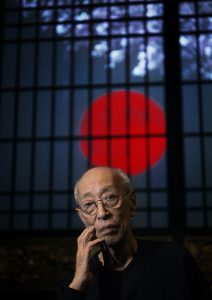
Be they hero or villain, the emotional capacity and breathtaking portrayal of the actors made even one so familiar with the story on the edge of their seat. If only Yukio Ninagawa could have seen the thousands of attendees at the sold-out theater in New York all rise to their feet for multiple hard-earned and well-deserved standing ovations for the final staging of his monumental achievement! But just like the sakura (cherry blossoms), even things of great beauty are ephemeral.
NINAGAWA Macbeth runs July 21-25, 2018. Lincoln Center Mostly Mozart Festival runs from July 12-August 12, 2018. For more information and the full festival offerings, visit: http://www.lincolncenter.org/mostly-mozart-festival
 Tuesday, July 8, 2025
Tuesday, July 8, 2025